The Story of the Yuki-onna
Reading time: 9 min
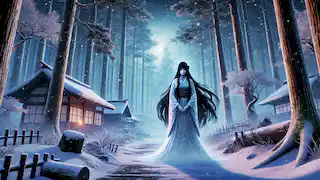
About this story: The Story of the Yuki-onna is a Legend from Japan set in the Medieval This Dramatic tale explores themes of Loss and is suitable for All Ages. It offers Cultural insights. A haunting tale of love, loss, and the icy grip of winter.
{{{_Intro}}}
In the deep winter months of Japan, when the snow blankets the land in an endless sea of white, the villagers would gather around their hearths, telling tales to ward off the cold. Among these tales, none was as chilling or as captivating as the legend of the Yuki-onna, the Snow Woman. Her story was one of beauty, tragedy, and the supernatural, passed down through generations, a reminder of the mysterious forces that lurked in the frozen wilderness.
The Origin of Yuki-onna
Long ago, in a remote village nestled in the mountains of northern Japan, there lived a young woman named Yuki. She was known throughout the region for her unparalleled beauty, with skin as pale as the snow that fell each winter and eyes as cold and blue as the ice that formed on the river. Despite her ethereal appearance, Yuki was a kind-hearted soul who lived a humble life with her family, helping them tend to their modest farm.
But the mountains were a harsh place, especially in winter. The snowstorms could last for days, cutting off the village from the outside world and trapping the villagers in their homes. It was during one such storm that Yuki’s life changed forever.
One night, as the wind howled through the trees and the snow piled high against the doors, a traveler knocked on Yuki’s door. He was a samurai, lost and weary, seeking shelter from the storm. Yuki’s family welcomed him in, offering him warmth and food. The samurai, grateful for their hospitality, stayed with them for several days as the storm raged on.
During his stay, Yuki and the samurai grew close. He was captivated by her beauty and kindness, and she was drawn to his strength and nobility. They spent hours talking, sharing stories of their lives and dreams. By the time the storm had passed, they had fallen deeply in love.
But their happiness was short-lived. The samurai was called back to his lord’s service, and he had to leave Yuki behind. He promised to return for her, but as the days turned into weeks, and the weeks into months, Yuki began to despair. The coldness in her heart grew, mirroring the frozen landscape around her.
One day, Yuki ventured out into the mountains to search for her beloved. She wandered through the snow-covered forests and across the icy rivers, but there was no sign of him. Finally, exhausted and heartbroken, she collapsed in the snow, her tears freezing on her cheeks. As she lay there, she felt the cold seep into her bones, her body becoming one with the snow. In that moment, Yuki died, but her spirit lived on, transformed by her sorrow and the icy grip of the winter.
Thus, the Yuki-onna was born, a ghostly figure who roamed the mountains, luring lost travelers to their doom with her beauty. She was no longer the kind-hearted Yuki, but a creature of the snow, cold and unforgiving.
The Legend Grows
Over the years, stories of the Yuki-onna spread throughout Japan. She was said to appear on the coldest nights, gliding silently through the snow, her long black hair flowing behind her, and her white kimono billowing in the wind. Her beauty was so captivating that those who saw her were instantly entranced, unable to look away. But her touch was deadly, for she was as cold as the ice that formed in the deepest winter.
It was said that the Yuki-onna would appear to travelers who were lost in the snow, offering them shelter and warmth. But as soon as they accepted her offer, she would reveal her true nature, freezing them to death with a single breath. Some stories claimed that she would simply lead them deeper into the mountains until they succumbed to the cold. Others told of how she would embrace her victims, turning them into ice statues that would remain frozen in place until the spring thaw.
Despite these terrifying tales, there were those who believed that the Yuki-onna was not entirely evil. Some said that she was simply a lost soul, trapped between the worlds of the living and the dead, unable to find peace. They believed that if a person could show her true kindness and compassion, she might spare them and even help them find their way home.
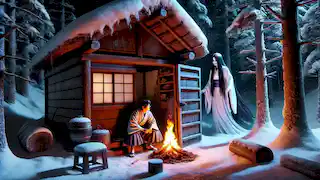
One such story was that of Minokichi, a young woodcutter who lived in a small village near the mountains. One winter, while out gathering wood with his father, Mosaku, they were caught in a sudden snowstorm. Unable to find their way back to the village, they took shelter in a small hut they found deep in the forest. As the night grew colder, they huddled together for warmth and soon fell asleep.
In the middle of the night, Minokichi awoke to find the door of the hut wide open. Standing in the doorway was a woman, her skin as pale as the snow outside, her long black hair framing her face like a veil. Minokichi was struck by her beauty, but he also felt a chill run down his spine, for he knew that this must be the Yuki-onna.
Before he could react, the Yuki-onna floated over to his father, who was still asleep, and breathed on him. Minokichi watched in horror as his father’s face turned white, his body frozen in place. The Yuki-onna then turned to Minokichi, but as she gazed into his eyes, something changed. Instead of freezing him as she had done to his father, she spoke to him in a soft, almost sorrowful voice.
“Young one,” she said, “I cannot bring myself to harm you. You are too young, and your heart is pure. But you must never speak of what you have seen here tonight, or I will return and take your life.”
With that, she vanished into the night, leaving Minokichi alone in the freezing hut with his father’s lifeless body.
A Twist of Fate
Minokichi kept his promise and never spoke of the Yuki-onna to anyone. He returned to his village and continued his life as a woodcutter, but the memory of that night haunted him. Years passed, and Minokichi grew into a strong young man. One day, while walking through the forest, he met a beautiful young woman named Oyuki. She was unlike anyone he had ever met, with skin as pale as snow and eyes as deep as the winter sky.
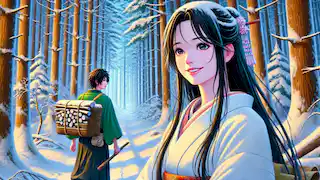
Minokichi was instantly smitten, and before long, they were married. They lived happily together, and Oyuki proved to be a kind and loving wife. They had children and built a life together in the village. But Minokichi could not shake the feeling that there was something familiar about Oyuki, something that reminded him of the Yuki-onna.
One winter night, as they sat together by the fire, Minokichi could no longer keep his secret. He told Oyuki about the night he had encountered the Yuki-onna in the forest and how she had spared his life. As he finished the story, he noticed that Oyuki had become deathly pale, her eyes wide with fear.
“How could you break your promise?” she whispered, her voice trembling.
Minokichi realized too late that Oyuki was none other than the Yuki-onna herself. She had taken on human form to be with him, but now that he had broken his promise, she could no longer stay. Tears streamed down her face as she stood up, her form beginning to fade.
“I loved you, Minokichi,” she said, her voice filled with sorrow. “But you have broken your word. I cannot stay with you any longer.”
Before Minokichi could say anything, Oyuki vanished, leaving him alone by the fire. He searched for her in the forest, calling her name, but she was gone. The Yuki-onna had returned to the snow, leaving Minokichi to live out the rest of his days with the memory of the love he had lost.
The Legacy of Yuki-onna
The story of the Yuki-onna has endured for centuries, a haunting reminder of the power of nature and the fragility of the human heart. She is a figure of both fear and pity, a ghostly presence that lingers in the minds of those who hear her tale.
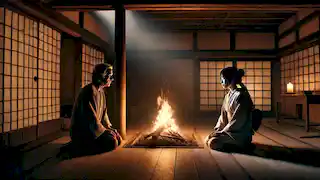
In some versions of the story, the Yuki-onna is said to still wander the mountains, searching for her lost love, her sorrow never-ending. In others, she is a vengeful spirit, punishing those who dare to cross her path. But in all the stories, she remains a symbol of the cold beauty and danger of winter, a force that can be both mesmerizing and deadly.
Even today, in the rural villages of Japan, when the snow falls heavy and the nights grow long, the elders tell the story of the Yuki-onna to the children, warning them never to wander too far from home in the winter, for the Snow Woman might be waiting for them in the shadows.
The Enduring Myth
The legend of the Yuki-onna has inspired countless works of art, literature, and film, both in Japan and around the world. She has become a symbol of the mysterious and the supernatural, a reminder of the thin line between life and death, love and despair.
But beyond the ghostly figure of the Yuki-onna, her story speaks to a deeper truth about the human condition. It is a tale of love and loss, of promises made and broken, of the longing for something that can never be. In the cold beauty of the Yuki-onna, we see our own fears and desires reflected, a mirror held up to the darkest corners of our souls.
As the
snow falls outside, covering the world in a blanket of white, the story of the Yuki-onna continues to be told, a chilling reminder that some legends are more than just stories—they are a part of who we are.
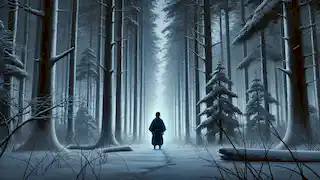
Conclusion
The Yuki-onna's tale is more than just a ghost story; it is a reflection of the timeless human struggles with love, loss, and the relentless passage of time. Her figure stands as a testament to the power of folklore, a haunting presence that continues to captivate and terrify those who hear her story. As long as the snow falls and the wind howls through the mountains, the legend of the Yuki-onna will endure, a part of Japan's cultural landscape that will never fade.










